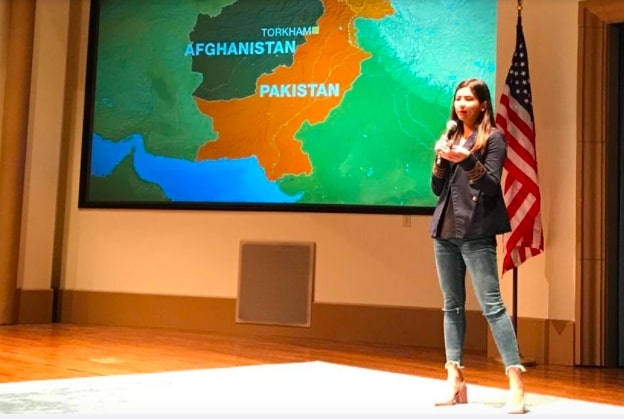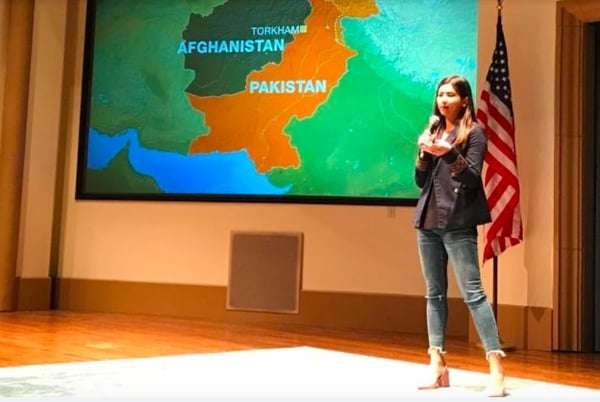Kroc School Student Seeks to Apply Her Learnings and Research Tools to Understand and Manage Conflict in Afghanistan

Kroc School Student Seeks to Apply Her Learnings and Research Tools to Understand and Manage Conflict in Afghanistan
The following post was contributed by Master of Science in Conflict Management and Resolution student Nasema Zeerak.
I am Nasema Zeerak from Ghazni, Afghanistan, a graduate candidate in the Master of Science in Conflict Management and Resolution (MS-CMR) program at the University of San Diego’s Joan B. Kroc School of Peace Studies (Kroc School).
 Nasema Zeerak presenting on the conflict in Afghanistan at the "Annual Rotary Peace Forum" at Kroc School.
Nasema Zeerak presenting on the conflict in Afghanistan at the "Annual Rotary Peace Forum" at Kroc School.
My desire to study conflict management and resolution was motivated by my personal experiences and trajectory. Growing up and witnessing violent conflict in Afghanistan in the 1990s and again in the late 2000s, I wanted to understand the conflict dynamics, historical events and the domestic and foreign factors that have affected me at the personal level and made Afghanistan what it is today – a country under foreign occupation, torn by endless war, and shaped by domestic political turmoil and endless suffering for Afghans. These personal and political concerns brought me to the Kroc School.
The MS-CMR program is uniquely designed to help graduate students understand the complex dynamics and underlying causes of conflict, and to develop informed and effective intervention strategies. The importance of such an approach is particularly clear when one considers that, globally, 25% of the wars that end in a negotiated settlement relapse into violence within five years1. Further, the longer the war continues, the more likely it is to exacerbate the structural factors that supported the outbreak of the war in the first place, leading to additional grievances and making peace more difficult to consolidate. Consequently, conflict resolution and post-conflict peacebuilding work has been focused on preventing the recurrence of conflict without making much progress in achieving aspects of positive peace. Thus, an essential prerequisite for conflict management and resolution is sound and theoretically informed analysis of violence and war to understand why people resort to violence in the first place.
Realizing the relevance of theory for conflict analysis and resolution, I chose the Kroc School to build on my theoretical foundation and to better understand and analyze conflicts and conflict dynamics. The MS-CMR program’s multidisciplinary approach has provided me with a unique opportunity to understand the underlying issues that have hampered Afghanistan’s ability to reach a lasting and sustainable peace. Courses such as International Human Rights and Justice, Human Rights Advocacy, and Transitional Justice have furthered my understanding of ways in which human rights violations and injustices fuel and sustain conflicts over time. Similarly, Conflict Analysis and Resolution and International Conflict Prevention courses have enhanced my ability to understand and analyze the many layers and actors in the conflict in Afghanistan – and to look at the conflict from multiple perspectives. With this skill, I’ve been able to more clearly see the maximum constructive potential of those involved, and also identify key elements that have the potential to prevent the conflict from escalating.
The Kroc School doesn’t just focus on the theoretical side of peacebuilding, social innovation, and conflict resolution. It also puts a strong emphasis on practice. One way it does this is by offering invaluable opportunities to students through the Kroc Institute for Peace and Justice (Kroc IPJ). Currently, I’m working as a research intern with Impact:Peace, an initiative at the Kroc IPJ aimed at reducing global violence and supporting greater peace, which has enabled me to connect conflict resolution and post-conflict peacebuilding theories to pressing contemporary global issues. At Impact:Peace, we are working to connect knowledge and evidence directly to the advocates, shapers and influencers who are driving change processes. The hope is to accelerate those processes, making them, ultimately, more effective.
While at Impact:Peace, I have been able to conduct research on three critical topics. First, the overreliance on militaristic approaches to peacebuilding and its potential to perpetuate violence and war. Second, effective strategies to address community violence. And lastly, communities that have resisted violence and mass atrocities during conflicts such as communities during the civil war in Afghanistan or Rwanda during the genocide. Working closely with the team provides valuable firsthand experience in learning how to conduct research – from conceiving an idea and thinking about the conceptual framework, all the way through to analysis. My experience with Impact:Peace has been tremendously helpful for staying abreast of current affairs in the international system by enabling me to put into practice the tools I have learned in the classroom.
Today, after decades of protracted and violent war, my country has been presented with a historic opportunity with the upcoming peace talks, and as an Afghan who grew up in the post-9/11 era, I see both an opportunity and a responsibility to attain and promote a better understanding of aspects of my country that have been perhaps undertheorized and poorly understood. My hope is to improve, through research, overall knowledge of the conflict, state-building, and peacebuilding efforts in the post-9/11 era. The MS-CMR program has equipped me with the theoretical grounding, skills, and tools to execute serious and rigorous research to this end. Further, it has opened doors to build personal relationships, receive guidance, and collaborate on important issues with faculty, program officers and my peers– their partnership has been deeply encouraging as I take on this challenging, yet rewarding endeavor.
Learn more about the Kroc School's Master's in Conflict Management and Resolution program.
1 Ramsbotham, O., Woodhouse, T., & Miall, H. (2016). Contemporary conflict resolution. Cambridge, UK: Polity Press.
Contact:
Justin Prugh
jprugh@sandiego.edu
(619) 260-7573

About the Author
The Joan B. Kroc School of Peace Studies (Kroc School) at the University of San Diego is the global hub for peacebuilding and social innovation. Founded in 2007, the Kroc School equips the next generation of innovative changemakers to shape more peaceful and just societies. We offer master's degrees in peace and justice, social innovation, humanitarian action, conflict management and resolution, and a dual degree in peace and law — programs that have attracted diverse and dynamic students from more than 50 countries. In addition to our graduate programs, the Kroc School is home to the Kroc Institute for Peace and Justice (Kroc IPJ). Founded in 2001, the Institute supports positive change beyond the classroom. Through groundbreaking research, experiential learning, and forward-thinking programs, the Kroc School and Kroc IPJ are shaping a future in which peaceful co-existence is the new normal.





